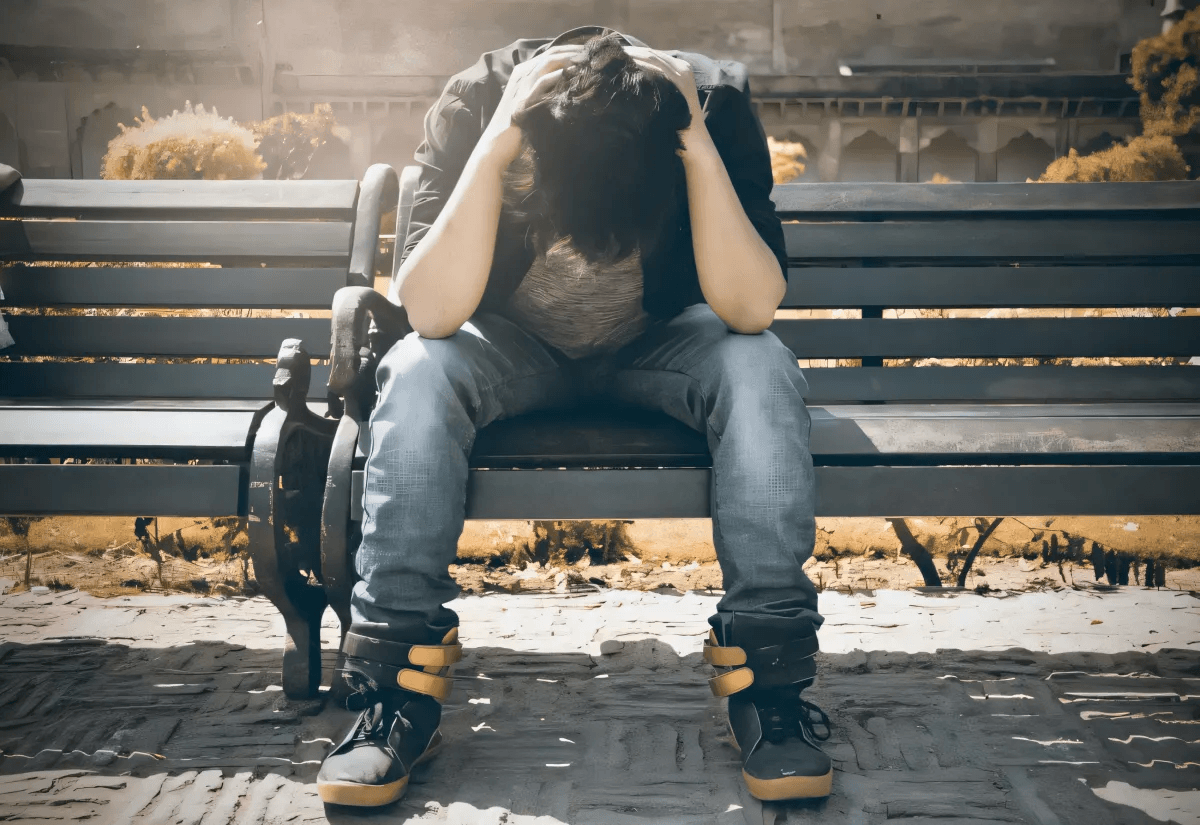How People Can Be Addicted To Suffering

Addictions are often thought of as actions and things we engage with outside of ourselves that eventually get us to crave them more. But not all addictions are external, some are internal.
Emotional addictions can happen either with positive emotions or negative ones. Addictions to negative emotions often get labeled as addictions to suffering.
Now, feeling emotions is not bad, in short term the use of fear can help us out of a dangerous situation through the fight or flight, and freeze response; anger can alert us that a personal boundary is being crossed, and grief can help us move on after a loved one has died.
The problem comes when negative emotions are continually experienced in a loop, which then creates a vicious cycle. According to the American Psychiatric Association (APA) aside from creating cycles, negative emotions pose the ability to alter brain functions, which as consequence may play a role in an individual’s behavior and mental health.
The APA also states that when it comes to addiction, it is not a single thing that contributes to it but a myriad of situations that can come from either outside or inside of ourselves.
In this article though, we will talk about the possible chemistry and brain functions that may create and maintain addictions when it comes to the emotions of fear, anger, and grief.

Fear may maintain an addiction
In an article for Fox News, Abigail Marsh, an associate professor of psychology at Georgetown University, stated that "Fear is the expectation or anticipation of possible harm.."
"This expectation or anticipation usually comes from a fear that is learned or taught, but fear is also instinctual",
- Dr.Theo Tsaousides
Now, what happens when you experience fear? According to Marsh, the brain (amygdala) releases a chemical called glutamate that sets off other responses in the body.
Glutamate plays a central role in processes underlying the development and maintenance of an addiction.
Tzschentk and Schmidt's study established that the processes in which glutamate had a role were "reinforcement, sensitization, habit learning, and reinforcement learning, context conditioning, craving, and relapse."
What happens in our brain when we experience fear?
Glutamate, which is produced in your brain, interacts with other chemicals including dopamine, to create and maintain addiction. But, the risk of actually suffering from an addiction to fear only comes when this feeling is experienced constantly.
Dr.Tsaousides explains how fear that is felt constantly impacts people, stating that chronic stress, free-floating anxiety, constant worry, and daily insecurity can quietly but seriously harm your physical and mental health over time.
Take someone with social anxiety for example. One of the things a person with social anxiety worries obsessively about is being judged and watched by others. The fear of being watched and judged keeps the person in a state of wariness, which in the long run depletes the person's physical and mental energy.
This is because the body is in a constant state of alertness and stress which it cannot relieve itself from. It functions in an imbalanced state and puts pressure on certain processes that it's not supposed to put pressure on.
Anger rushes can become addictive
When it comes to anger, epinephrine and non-epinephrine are the chemicals responsible for it.
According to World of Chemicals, Epinephrine or adrenaline is released by the adrenal glands and lets the amygdala know to send signals which speed up your heart rate and display other signs of you becoming angry.
World of Chemicals also states that non-epinephrine is the adrenaline rush and it monitors your heart rate and blood pressure, it is also responsible for the decision making relating to handling the situation in a positive or negative way.
Ok, but how can anger become addictive? According to an article written by Jean Kim M.D., anger becomes addictive when it begins to feel comfortable and good to get the rush that comes from it to boost your ego or as a regular emotional avoidance strategy.
For example, always turning to angry outbursts such as screaming, stomping away, or rolling your eyes and actively ignoring other people whenever things aren't going your way or someone tries to talk to you about something you did wrong.

Effects of constant grief on your emotional state
Behind grief is a chemical called adrenocorticotrophin. PsychCentral explains how, after adrenocorticotrophin is created in the pituitary gland, it then travels to the adrenal gland and causes cortisone to be produced.
Cortisone, the stress hormone, can then make the body create and feel other emotions, such as fear and sadness in an endless loop.
An example of negative emotions being reproduced in the body continuously can be seen through catastrophization.
Catastrophization is a cognitive distortion that prompts people to jump to the worst possible conclusion usually with objective reason to despair.
This "objective reason to despair" usually leads the person to keep the thought cycle going until it becomes a habit. By this time the brain is used to it and it can be said that it is already addicted.
If this process extends to many months it results in very high levels of cortisol in the blood causing the immune system to weaken.
Stress and dopamine can make you addicted to your emotions
The fear, anger, and grief hormones don't act alone though. A common denominator created when these emotions are being felt is stress and by default, its hormone, cortisol. Another common denominator is dopamine or the "happiness hormone".
What do dopamine and cortisol do to create addictive emotions?
Stress to Strength, states that stress and drugs have been shown to have similar side effects like increased heart rate and blood pressure, anxiety, panic attacks, depression, and other effects.
Stress can be addictive to some people because of the adrenaline rush that is created in the brain when it secretes cortisol, adrenaline, and non-adrenaline.
When it comes to dopamine, an article by Crystal Raypole published in Healthline, states that dopamine's role is in reinforcing enjoyable sensations and behaviors by linking things that make you feel good with a desire to do them again.
Raypole explains that these enjoyable experiences activate the brain's reward system which releases dopamine and leaves you with a strong memory of the pleasure this prompts the person to make an effort to experience it again.
As with any other chemicals in our brain, if cortisol and dopamine are consistently created and produced in unbalanced ways we may end up being addicted to our emotions.

What can you do to get out of emotional addiction?
There are many things that you can do to start your journey of recovery from addiction. The list below gives a few options of what you can do to get out of emotional addiction.
1. Get help
Getting help by going to a professional will help you get more insight on how to proceed if you do have an addiction. These professionals are trained with tools that the rest of us do not have or don't know about.
Now, we have to admit that not all therapists are a good fit for us so, take the time to find the one that you feel understands you and can help you.
2. Journaling
This is definitely a favorite among a lot of people. Journaling helps the writer express their feelings. Once you put it on paper, the energy is released and you don't feel that burden anymore.
It also helps you look back with a clear mind, analyze situations, and see yourself in a different light. Through this process you can see what it is you need to work on, what's truly bothering you, you can become more aware of yourself and you can see your growth develop over a period of time.
Journaling also helps you observe your thoughts and detect the triggers that make your mind or actions go to a dark place. Once you are aware of that, it is easier to catch yourself and redirect your thinking to or transform it into something more positive.
3. Meditation
The National Center for Complementary and Integrative Health (NIH) states that research on meditation may help with physical symptoms as well as some psychological disorders such as anxiety, depression, insomnia, anger, distress, and stress.
People who have been meditating for a while have said that it does improve their focus, improve their memory, helps them become more aware, and helps them be calm and peaceful.
Meditation comes in many different ways, so if you want to try this know that you don't have to limit yourself to just sitting in a room quietly with your eyes closed.
4. Gratefulness
I'm sure you have heard how being grateful or giving gratitude can make you feel better and also make us aware of all the good things we have.
Resources to Recover (RTOR), a site dedicated to helping families with mental health conditions find resources, states that "gratitude increases neural modulation in the brain which regulates negative emotions."
RTOR continues by saying that gratitude can contribute to "help cure insomnia, reduce stress hormones, and positively impact bodily functions, memory, and emotions."
Keep in mind that studies such as these required the participants to practice gratitude on a daily basis, if you want to try practicing gratitude or any of the other methods try to work your way up into doing them daily to get the most benefit out of them.
Doing your own research and following these steps will get you on your way to overcoming your emotional addiction to live a freer and happier life.
Opinions and Perspectives
This information could really help people recognize and address these cycles in their lives.
The scientific breakdown helps make this less about personal failure and more about understanding patterns.
Makes me more aware of how I might be feeding into these patterns myself.
Really appreciate how they balanced scientific explanation with practical solutions.
Understanding the science helps remove some of the shame around these patterns.
The way they explained the brain chemistry makes it easier to understand these patterns.
Fascinating how the brain can essentially trick itself into craving negative experiences.
Makes me think about how many people might be stuck in these patterns without realizing.
The advice about finding the right therapist is crucial. One size definitely doesn't fit all.
Interesting how they linked different negative emotions to specific chemical responses.
Being aware of these patterns is one thing, breaking them is another challenge entirely.
Never considered that feeling stressed could become addictive. Makes sense though.
The article makes me wonder about the role of social media in amplifying these cycles.
Wish they'd included more about genetic predisposition to these patterns.
I've noticed these patterns in family members but never knew how to explain it.
The brain chemistry explanation helps explain why some people seem stuck in victim mode.
Helpful to understand the science behind these patterns. Knowledge really is power.
The fear cycle description is spot on. Once it starts it's like a snowball effect.
This explains why drama can be so addictive for some people. It's literally a chemical response.
Actually tried the gratitude practice they mentioned. It does help shift focus from negative patterns.
The solutions section feels a bit basic. These patterns are usually more complex to break.
Would love to see more research on how digital age affects these emotional addiction patterns.
The part about cortisol levels affecting immune system is scary. Really shows the physical impact.
Interesting that they mentioned both internal and external factors. Makes me think about my own habits.
The article could have gone deeper into how childhood experiences shape these patterns.
Anyone else notice how social media seems to feed into these addictive emotional patterns?
The brain chemistry explanation helps me feel less guilty about these patterns. It's not just me being difficult.
Never thought about dopamine playing a role in negative emotions. Always associated it with pleasure.
My therapist mentioned something similar about stress addiction. This article helps make sense of what she was saying.
Wonder if this relates to why some people always seem to find themselves in dramatic situations.
The social anxiety example really resonated with me. It's like being stuck in a fear loop you can't escape.
I've actually found anger to be quite addictive in my experience. That rush they mentioned is real.
The chemical aspect explains why these patterns can be so hard to break. It's not just about willpower.
Not sure I buy into all of this. Sometimes life just is difficult, doesn't mean we're addicted to suffering.
The connection between grief and stress hormones explains a lot about why some people stay stuck in mourning.
Honestly just reading this made me more aware of my own patterns. I catch myself catastrophizing way too often.
Really appreciate how they explained the science without making it too complex. The fear response explanation was particularly clear.
The article makes some good points but I wish they'd included more about breaking these cycles once you recognize them.
Does anyone else feel like they're sometimes seeking out things to worry about? Now I understand why.
I find it fascinating how our bodies can essentially hack themselves into craving negative experiences.
Can't believe they didn't mention exercise as a solution. It's been crucial in managing my anxiety cycles.
The bit about gratitude practice seems promising. Less intrusive than therapy but still practical.
This explains why I keep watching sad movies even though I know they'll make me cry. Must be that dopamine-cortisol connection.
The meditation recommendation seems a bit simplistic. Some of us need more than just quiet time with our thoughts.
The chemical explanation makes sense but what about people who've experienced trauma? Surely that's different from being 'addicted' to suffering.
Yes! I've been journaling for six months and it's amazing how it helps identify patterns in my emotional responses.
Anyone tried the journaling suggestion? I'm curious if it actually helps break these emotional cycles.
The section about anger addiction really hit home. I've caught myself getting that adrenaline rush from arguments more times than I'd like to admit.
I think we need to be careful not to oversimplify this. Not everyone who experiences negative emotions is addicted to suffering.
Interesting point about social anxiety. I can relate to that constant state of alertness they mentioned. It's exhausting.
The part about glutamate's role in fear addiction is fascinating. Makes me wonder if this explains why some people seem to seek out scary situations.
I've definitely noticed myself falling into patterns of catastrophizing. It's like once I start worrying, my brain just won't stop.
This article really opened my eyes about how our brains can actually get hooked on negative emotions. I never realized fear could be addictive.
